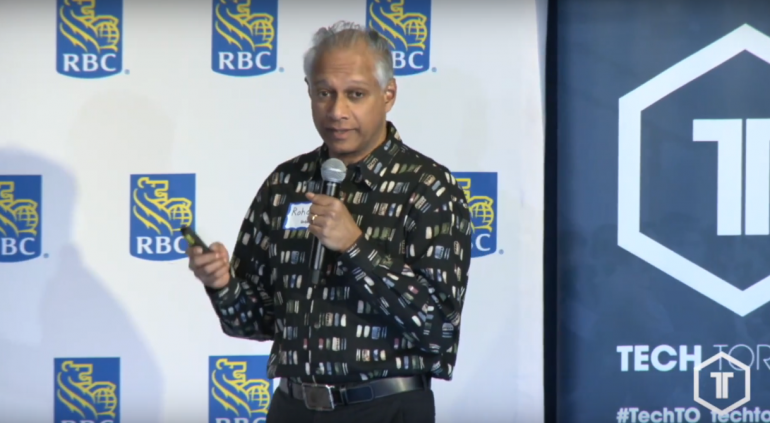When LEAGUE founder and CEO Mike Serbinis presented at TechTO in January, he asked a room full of entrepreneurs whether they “honestly believe” they can change the world in a massive way, while living in Toronto.
At the latest TechTO, held earlier this month, Rohan Jayasekera, the chief technology officer at Urbery, answered that question with a resounding “yes,” and shared five examples to show that Toronto has been a world-class tech city for decades.
Jayasekera said that Toronto pioneered the first personal computer in 1974, but this fact is forgotten as new technologies have emerged.
“When you create something that’s new, it’s yours for the rest of your life.”
“This is actually normal in technology. The pioneers get forgotten because things grow and change,” he said. He also alluded to Steve Mann, who was recently appointed as the chief scientist at Istuary Innovation Labs. Mann pioneered wearable technology and invented the EyeTap Digital Glass in 1978, which allows the human eye to effectively become both a camera and TV screen.
Jayasekera said Toronto has also contributed to the development of the web. In 1995, a Torontonian named Carolyn Burke created the first blog, a concept that was novel at the time.
Jayasekera’s fourth example was Sympatico, which he said was among the world’s first consumer and public internet services. “This is the first time you could get on the internet from home without being techy,” said Jayasekera, who led the technical development of Sympatico.ca in the mid-1990s. “If you had a computer and knew how to use it, you could get on the internet.”
While Canadians were pioneers in this space, Jayasekera once again pointed out that these contributions were forgotten when the US launched its own WorldNet service six months after Sympatico’s creation.
According to Jayasekera, the latest space that Toronto has been leading in is artificial intelligence and deep learning. He said that in 2012, University of Toronto professor Geoffrey Hinton made a breakthrough in deep learning, a technique that will help companies like General Motors (GM) build technologies like self-driving cars.
“So when the people at GM are building their self-driving vehicles, they actually have a better time right now because thanks to deep learning, their software has a much better chance at processing the objects that the car’s cameras pick up,” said Jayasekera, adding that the recent launch of the Vector Institute will continue to help Toronto grow in this space.
Overall, Jasakeyera wanted his audience to recognize that Toronto, and at large, Canada, is capable of changing the world in a massive way. He encourages new and future entrepreneurs to strive for creating things that are new and different to raise the city’s position as a global tech hub.
“If you’re going to do anything that’s new or different, you will have to break from the pack,” said Jayasekera. “I can tell you it’s worth it if you actually do something new. Yeah you might be influential, you might not be, but if you actually do something new, that you look around and say ‘Hey, nobody’s done this before,’ go ahead, go for it, and create because when you create something that’s new, it’s yours for the rest of your life.”
Watch the full presentation below:
The next TechToronto takes place on May 8. Get your tickets now!


